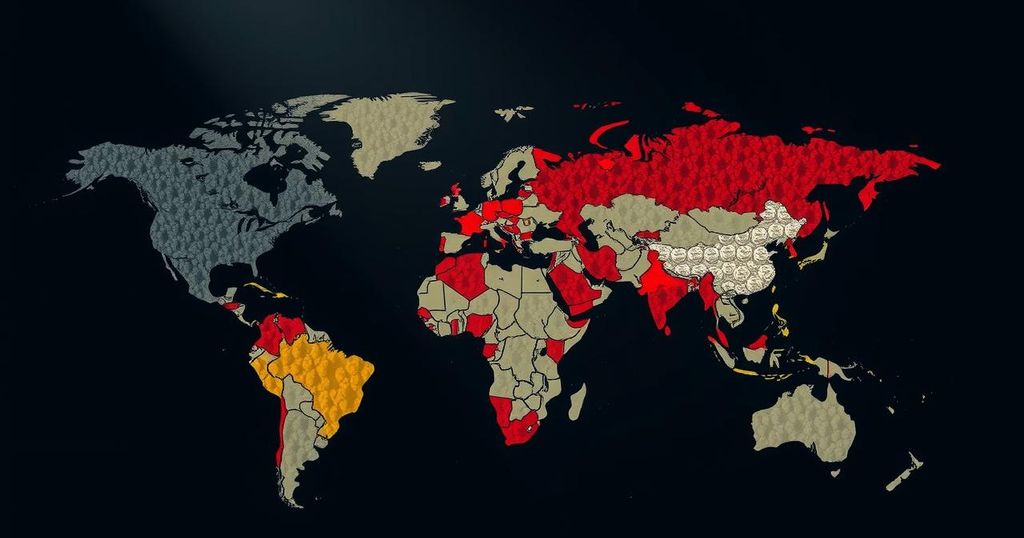Humanitarian Crisis Escalates: Record Aid Worker Deaths in Conflict Zones

In 2024, humanitarian worker fatalities have reached a grim milestone of 281 deaths amid escalating conflicts, especially in Gaza, where violence severely restricts aid operations. Concurrent crises in Lebanon, Haiti, Ukraine, and Guinea underscore exacerbated humanitarian needs and the urgent necessity for international protective measures. While humanitarian efforts persist, the environment remains perilous and desperate, necessitating immediate action to protect both civilians and aid workers.
Aid workers face unprecedented danger across multiple global crisis zones, with 2024 being the deadliest year recorded, as reported by the Office for the Coordination of Humanitarian Affairs (OCHA). This tragic toll includes 281 deaths, exceeding the previous year’s lamentable total of 280 fatalities. OCHA stresses that the escalating violence, particularly in Gaza, necessitates the protection of humanitarian personnel under international law, urging states to act decisively against this growing impunity.
In the context of the ongoing Gaza conflict, airstrikes continue to devastate the region, severely impacting Palestinian civilians. Recent attacks have resulted in the loss of shelter for families and ongoing humanitarian access restrictions, significantly hampering relief efforts. Despite these challenges, humanitarian organizations work to provide food, medical assistance, and shelter. Although aid deliveries in Gaza are limited, efforts continue to alleviate suffering during the winter months.
In Lebanon, intense airstrikes have caused significant civilian casualties, with 40 lost in a single day in the Baalbeck-Hermel region. According to OCHA, there have also been numerous assaults on healthcare facilities, illustrating the need for protection of medical personnel amid the violence. Humanitarian assistance programs are ongoing, providing essential supplies and support to those affected by the conflict.
Similarly, in Haiti, violence is displacing thousands, particularly in Port-au-Prince, where armed group activities have significantly increased insecurity. Displaced populations are receiving water and medical support and food distributions to address urgent needs despite the volatile environment.
In Ukraine, as winter progresses, residents endure heightened humanitarian challenges due to sustained military assaults and damage to energy infrastructure. Recent attacks in Sumy City have again claimed civilian lives, exacerbating an already critical situation.
Lastly, in Guinea, flooding has led to substantial displacement and challenges regarding infrastructure. The UN has allocated emergency funds to aid over 60,000 individuals impacted by the floods, ensuring the provision of food, health services, water, and educational support.
The humanitarian crises in these regions illustrate the urgent need for international cooperation and adherence to humanitarian law to protect those who serve others amidst conflict. As the situation remains dire, humanitarian agencies persist in their commitments to provide life-saving assistance, often under perilous conditions.
Humanitarian workers operate in increasingly hostile environments globally, facing violent assaults and extreme danger while attempting to deliver essential services. This year has been notably catastrophic, with violence dramatically increasing due to ongoing conflicts in regions such as Gaza, Lebanon, Haiti, Ukraine, and Guinea. International organizations like OCHA and the UN continue to highlight these critical crises, calling for enhanced protections for aid workers and vulnerable populations affected by humanitarian crises. Armed conflicts not only affect the lives of civilians but also jeopardize the operations of humanitarian agencies dedicated to providing relief support.
In summary, the humanitarian landscape is marked by profound challenges as aid workers confront unprecedented violence in conflict-stricken regions, leading to tragic fatalities. The reports across Gaza, Lebanon, Haiti, Ukraine, and Guinea signify an urgent need for enhanced protection under international humanitarian law. The unwavering commitment by humanitarian agencies to alleviate suffering amidst these crises reflects a vital, ongoing effort needing global support and acknowledgment.
Original Source: www.unocha.org








